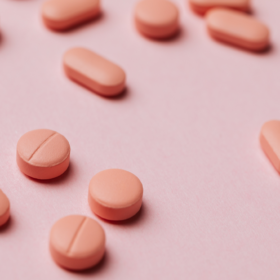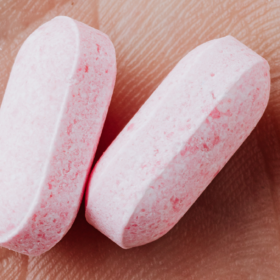
Why do I keep getting UTIs?
In this article
What's the lowdown?
One UTI is bad enough, but for some of us they just keep on coming back, known as rUTIs (recurrent UTIs)
There are a range of factors which seem to influence why some people experience rUTIs, everything from our genetics to how often we are having sex!
If you experience frequent UTIs, it’s super important to see your medical team to make sure that you are receiving the help and support you need
Also remember that UTIs can have similar symptoms to a sexually transmitted infection (STI), so make sure you are up to date with your STI screening
Other than antibiotics, there are different treatment options to try. One promising remedy is D-mannose
We also have an Amazon link for you (affiliate!)
Why do I keep getting UTIs?
UTIs (urinary tract infections) are extremely common, with statistics showing from 33% to 60% of women experiencing one across their lifetime. They are infections of the bladder and tubes carrying urine from the bladder to outside your body and require antibiotics to treat. Whilst some individuals may experience a one-off infection, for some, recurrent UTIs (rUTIs) are a painful reality.
UTIs are considered recurrent if there are 3 positive urine cultures during a 12 month period or 2 infections during the previous 6 months. A urine culture is when a sample of urine is sent to the lab and tested for bacteria. In the case of recurrent UTIs, it is usually the same bacteria that is causing the repeat of the infection.
There are a range of factors that can cause some people to get UTIs over and over again. These can vary hugely, with everything from anatomical differences to lifestyle related reasons, such as using spermicide coated condoms or not drinking enough water! Genetic factors might also have an impact, so if your Mum or other close relatives suffer from them, chances are you might too,
We are going to jump right in and have a closer look at some of the causes and how you can try to minimise the recurrence of infection.
Causes of UTIs:
- Hygiene and lifestyle
- Sexual activity
- Health issues
- Genetic
- Is there a link between recurrent UTIs and cancer?
Hygiene and Lifestyle
To minimise recurring UTIs, there are some measures that relate to hygiene and lifestyle practices that may prove to be beneficial:
- Always wipe from front to back (to reduce the chance that harmful bacteria can enter the urinary tract from the bowel)
- Drink plenty of water
- Don’t hold in your wee for too long – empty your bladder when you need to
- Try not to use cosmetic bath products, especially scented ones (bath oils, vaginal creams or lotions) or feminine ‘hygiene’ washes and douches
Sexual Activity
Having frequent sex can be one of the greatest risk factors for recurrent UTIs. This risk can be increased by the use of spermicides for contraception too. Studies have shown that there is a up to 4x increase of risk of a UTI on the second day after having sex.
It has been suggested that washing your bits before and after sex (and that of your partners too), could reduce the likelihood of a UTI, as it reduces the amount of bacteria that could travel into the urinary tract.
Although there is mixed evidence about peeing after sex, the National Institute for Health and Care Excellence (NICE), recommends it as a way to reduce risk of UTIs. There is also a recommendation for those with UTIs not to use a vaginal diaphragm or spermicide, as it can cause irritation.
Health Issues
Certain health issues can make it more likely that you’ll experience UTIs. Associated conditions include:
- Menopause: Hormonal changes around menopause can lead to more UTIs as well as things like vaginal dryness
- Genital Prolapse: This can increase the incidence as it can be more difficult to empty the bladder, which is a risk factor for UTI
- Neurological bladder dysfunction: Associated conditions include Parkinson’s disease, strokes, spinal cord injury, diabetes and multiple sclerosis. This is because conditions that affect the nerves, can also damage the nerves in the bladder, which can impact the bladder’s ability to fill and empty
- Urinary incontinence: This is rooted in problems with the muscles within the bladder and pelvic floor
Genetic Causes
Genes can play a part in whether we are affected by UTIs or not, because our genetic make-up is responsible for how our immune system reacts to bacteria in the body. Research has shown that UTIs do run in families, with one study concluding that 42% of family members were prone to UTIs compared to an 11% likelihood when there was no family history of infection. This risk further increased if the relation was a mother, daughter or sister – so perhaps now is the cue to have some slightly awkward bladder related dinner table conversation!
Looking to the future, the unique genetic factors that seem to make some individuals’ more prone to UTIs does mean that the treatment options of tomorrow may be more targeted towards specific genes and therefore more effective.
Is there a link between recurrent UTIs and cancer?
The research is slightly mixed, but some studies suggest that recurrent UTIs could be a risk factor for genitourinary cancers (e.g. bladder and kidney cancers). A potential factor is because women and people with uteruses who have bladder or kidney cancer may lose out on a diagnosis because they are being treated for UTIs (which can have some overlapping symptoms).
This is in no way meant to be a terrifying message, but trying to practice the different lifestyle and hygiene measures that can help to reduce re-infection is a proactive way to minimise chances of anything more serious going on. Also, if you do notice symptoms such as blood in your urine or any changes and you have concerns, definitely speak to your medical team!
What are the treatments for recurrent UTIs?
Some people may choose to take a continuous dose of antibiotics to treat UTIs, usually when other measures have failed to control the recurrence. In these cases, a low dose of antibiotics can be taken for periods of 6 months or longer. There can be a range of dosage frequencies e.g. taking antibiotics every three nights or on alternative nights.
Whilst being on continuous antibiotics seems to reduce the rate of UTIs, they don’t completely reduce the risk of contracting an infection. Taking antibiotics repeatedly can disrupt the helpful bacteria in the gut which can affect our general immune system, which may in turn increase the likelihood of a UTI.
Do all UTIs need antibiotics?
UTIs can be ‘self resolving’, so in some cases may clear up spontaneously and without any medical intervention. Keep reading for some tips on clearing cystitis.
However, without treatment, nearly half of those who have a self-resolving UTI go on to develop a recurrent UTI within the first year. It is estimated from trials that when no treatment is given, the rate of recurrence is around 2 to 3 cases per patient year.
If you are pregnant and have symptoms of UTI then please contact a healthcare professional, as this does need urgent antibiotic treatment to prevent complications.
Do the chances of getting a UTI increase when you’ve already had one?
If you experience one UTI there’s an approximately 20% chance of suffering from another. Of that amount, a further 30% will have yet another. And (if you’re still with me on this), of that last group, another 80% will have recurrences. So yes, there does seem to be a connection where one UTI leads to another!
When to see a doctor about recurrent UTIs
According to the NHS, the recommendation is to see your GP if:
- You’re pregnant with the symptoms of a UTI
- Your symptoms get worse or show no improvement within 2 days
- Your symptoms have come back despite treatment
There are ways to manage recurrent UTIs so it is really important that the reasons for the recurrence are fully investigated so that treatments can be put in place.
How to treat and prevent future UTIs
Aside from some of the lifestyle measures mentioned above there are different options for managing UTIs including:
- A short course of antibiotics
- Cranberry capsules or juices: some studies show that cranberry can stop harmful bacteria in the bladder
- Potassium citrate: said to change the pH of the urine which can reduces symptoms such as pain when going to the toilet
- Probiotics: can be beneficial in preventing recurrence by increasing helpful bacteria populations which can have positive effects particularly in preventing UTIs
- D-mannose: which stops harmful bacteria attaching to the bladder and causing infection. We have loads more information about using D-mannose as treatment for UTIs.
Other than antibiotics, some of the treatments above require further research. The information we have at present is particularly encouraging for D-mannose, which has even shown greater success than antibiotics at treatment and prevention of UTIs in research!
Our medical review process
This article has been medically reviewed for factual and up to date information by a Lowdown doctor.



